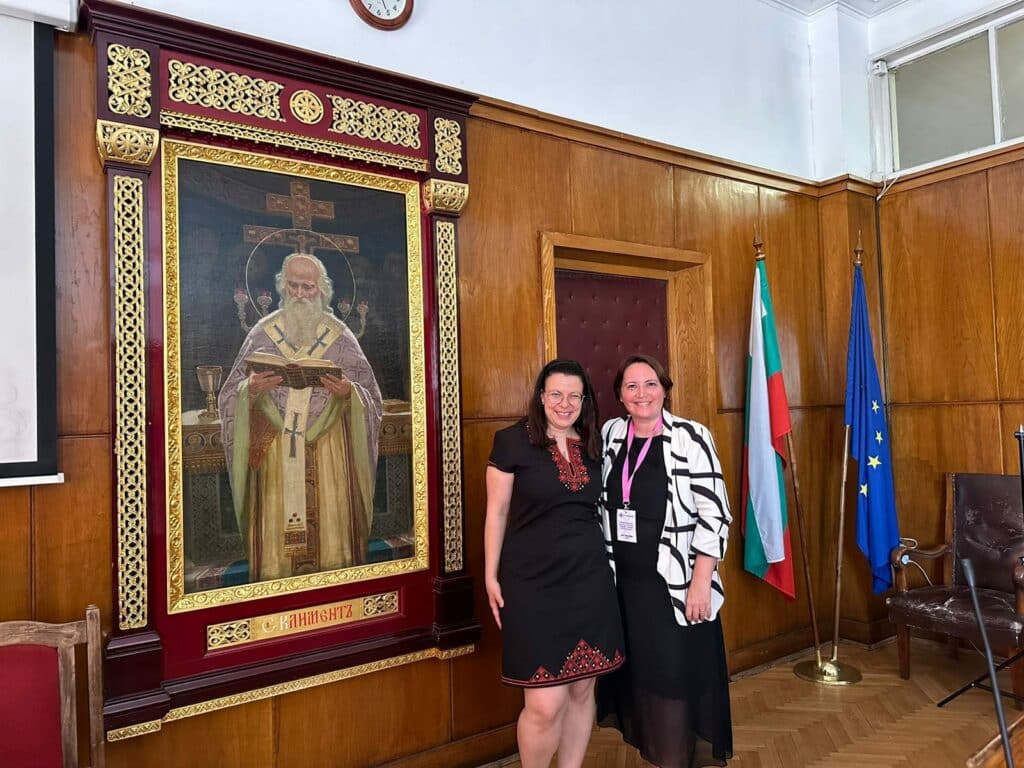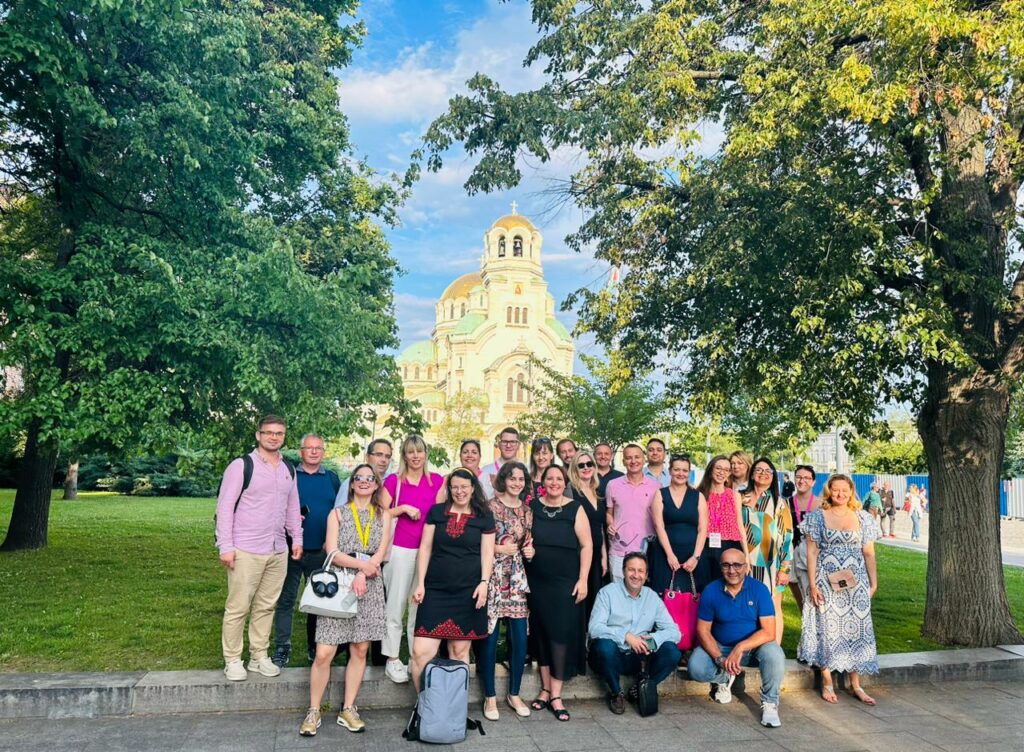Our battle for better healthcare is eternal
The conference entitled ‘Our battle for better healthcare is eternal’, was held on the 2nd and 3rd July 2023, and international renowned speakers shared their expertise on basic science, cancer registration, biobanking, digital health and collaboration with the pharma industry.
The conference was open to students, health care professionals, medical specialists, scientists and everybody else involved in the management of rare gynecological cancers. The full conference agenda with list of speakers is available here.
Prevention and screening for early detection are the first line of attack in the fight against cancer. The first day of the conference kicked off with the keynote speech from Dr. Ugyen Tshomo, who is a leading gynae-oncologist and advisor to the Ministry of Health in Bhutan. She described her sterling work in setting up a cervical cancer screening program in South Asia, and in particular how the gender-neutral vaccination program against human papilloma virus (HPV) and the uptake of the self-collected cervicovaginal sample for HPV testing, have drastically reduced the incidence of cervical cancer in her country, especially in rural areas. This novel approach to cervical cancer screening was part of the ‘REACH-Bhutan’ study.
This lecture was followed by that of Dr. Cristina Clare Gallego de Largy from Marques de Valdecilla University Hospital, Santander, Spain who, as part of the IDIWAKA organization, has been working in Uganda to set up a screening service for cervical cancer. She described this in in her interesting lecture, ‘Cancer of the Uterine Cervix: can be rare if we care’. Improvement in cervical cancer screening has been achieved through education of the general public, and thanks to the work of voluntary and non-governmental organizations who are constantly working very hard to reduce the incidence of cervical cancer in low resource areas.
The second session was dedicated to registration of patients with cancer, starting with a lecture on the present and future of the Bulgarian National Cancer Registry by Dr. Zdravka Valerianova, Head of Bulgarian National Cancer Registry. The year 2023 marks the 70th anniversary of the establishment of the Bulgarian cancer registry, despite the challenges involved in maintaining it. The experience of setting up cancer registration in a small country such as Malta was outlined by Prof. Neville Calleja from the Department of Health Information and Research within the Ministry for Health in Malta. Although there are disadvantages due to manpower and small numbers, there are pros as well in terms of accuracy of data collection and patient follow-up.
Dr. Gemma Gatta, former director of the Evaluative Epidemiology Unit, Fondazione IRCCS Istituto Nazionale dei Tumori, Milan, Italy, ensued by giving an overview of cancer registration in Europe, and how this has led to successful collaborative projects and advances in patient care on a national and international level. The Dutch National Breast Cancer Registry was described by Prof. Emiel Rutgers, surgical oncologist from the Netherlands Cancer Institute, Amsterdam, The Netherlands. Insight in the incidence and prevalence of cancer, which patients, which treatments, and prognosis of cancer is important to improve care for cancer patients, and the Dutch National Cancer Register is an ideal example to be followed, especially by those starting up. This is particularly important in the case of rare cancers, where standardized registration across countries, can facilitate data sharing and enable collaborative research, virtual biobanking and lead to smarter multicenter clinical trials.
Case in point are the gynecological congenital tumors. The latter are very rare, as described by Dr. Shady Saleem, President of Arab Society of Fetal Medicine and Chief of New Cleopatra Women’s Health Center, Cairo, Egypt. Congenital gynecological tumors can present as ovarian cysts found incidentally during antenatal ultrasound, or in the neonatal period with abnormal vaginal bleeding or discharge. These can of course be isolated or else part of a syndrome, and therefore the child will need to be followed up closely.
Although in recent years, there have been huge advances made in the management of breast cancer, there are still areas where the underlying pathophysiology is not well understood. In addition, recommended guidelines are not always followed in every country, especially in low resource settings. The surgical implications of a positive BRCA status in HER2negative early breast cancer were outlined by Prof. Emiel Rutgers.
To date, there is a poor understanding of the microbiome associated with normal breast tissue and breast diseases. The exploration of breast cancer microbiome to uncover mechanisms that can contribute to malignancy was outlined by Prof. Metodi Metodiev from the University of Essex, UK. Research has shown that breast tissue has a distinct microbiome with particular species specific to the breast tissue itself, as well as the breast aspirate and gut bacteria of women suffering from breast cancer. In addition, the breast and associated microbiomes may modulate the therapeutic response and serve as potential biomarker in the diagnosis and staging of breast cancer.
Policy makers, politicians, and small and medium enterprises (SMEs) in biotechnology, pharmaceuticals and computer science need to be involved in bridging the gap between basic and clinical research and their application in the development of a cost-effective roadmap dedicated to the fight against cancer, especially when this is rare. The role of digital health as well as the importance of accurate electronic medical records were discussed in detail by Dr. Alexander Simidchiev, Member of the National Assembly of Bulgaria and Head of Department of the Medical Institute MVR, and Dr. Boris Kostadinov, Director of Software Integrations at Information Services JSC, Bulgaria, respectively. Dr. Nikolay Genov Co-Founder and Chief Executive Officer of Leap Dynamics GmbH, Berlin, Germany, delivered a lecture entitled ‘Data science in medicine: changes and risks for the development of better healthcare’. The diverse amplification of big data has transformed the medical sector, fundamentally changing how the most basic procedures of health monitoring and interventions are conducted.
Mobile applications also play an important role in cancer prevention and management. One example is the LIFE mobile app created by the Bulgarian Breast and other gynecological Cancers Association (BBCA). This app is part of the core mission of BBCA, which is to improve survival of patients with breast cancer in Bulgaria working together with medical specialists, different organizations in Bulgaria and abroad, patients and patients advocates. Mobile apps contribute to the improvement in education, quality of life and survival of patients with breast cancer and their families.
Another session was dedicated to biobanking, and the legal aspects involved regarding patients’ informed consent for sampling and data sharing. The first Bulgarian virtual biobank for tumor tissues, COSMOS, was described by Prof. Angel Yordanov, who had set this up with Dr. Mariela Vasileva-Slaveva from the Medical University Pleven, Bulgaria. Virtual biobanking has been successful at facilitating the combination of clinical data and tumor samples from different institutions. Dr. Sharon O’Toole from Trinity St James’s Cancer Institute and Trinity College Dublin, Ireland delivered a lecture on the harmonization of a common dataset for biobanking of rare gynecological cancers. She presented the results of a survey which was held among the members of the GYNOCARE COST Action, in order to find out whether there were any biobanks for rare gynecological cancers, and if so, what tissues and/or data was being collected.
Ovarian cancer is still one of the most lethal cancers due to problems related to its early detection and hence effective treatment. Further research to help unravel the underlying pathophysiology of ovarian cancer is needed. The epigenetic regulation of BRCA1 and BRCA2 mRNA expression by promoter methylation and microRNAs in ovarian cancer was explained by Prof. Petar Ozretic from Ruđer Bošković Institute, Zagreb, Croatia, followed by his colleague Prof. Maja Sabol who gave an overview on ovarian cancer stem cells and their role in metastasis and resistance to therapies. Two medical students from the Faculty of Medicine and Surgery at the University of Malta ended the session by describing their work on the emerging role of PARP inhibitors for the treatment of ovarian cancer.
Prof. Antonio Giordano, President and Founder of the Sbarro Research Health Organization (SHRO) and his team at the Sbarro Institute for Cancer Research and Molecular Medicine, Temple University in Philadelphia, USA gave a keynote lecture on genes, environment and cancer, with particular emphasis on rare gynecological cancers. Exposure to endocrine disruptor compounds (EDCs) has been implicated as a contributing factor to a range of women’s health disorders including endometrial cancer.
Dr. Irina Tripac from the Department of Gynecology, Polivalent Hospital, Novamed, Chișinău 2038, Moldova, delivered a lecture on prognostic factors in uterine cancers. Given the low risk of lymph node metastases in the early stages of endometrial cancer (stage I-II) and the significant surgical and postoperative risks when performing a complete pelvic lymphadenectomy, the surgical approach in these patients is controversial. The recent introduction of sentinel node detection currently represents the best solution in reducing mortality, when compared to complete lymphadenectomy and omission of node dissection in patients with endometrial cancer. Given the presence of immune dysregulation in endometrial cancer, immune checkpoint blockade has the potential of being used as a targeted agent as monotherapy and in combination with cytotoxic chemotherapy or other immunotherapy. Dr. Velizar Shivarov Department of Clinical Immunology, University Hospital Alexandrovska, Medical University Sofia, Sofia, Bulgaria, proceeded with an explanation of the immune checkpoints in endometrial cancer.
The final session of the conference was dedicated to clinical trials. Prof. Francesca Pentimalli from LUM University, Bari, Italy defined what a good biomarker should be, especially since in the case of rare gynecological tumors, it is a crucial part of drug development and essential for successful regulatory approval. Currently there is a paucity of clinical trials which are specifically carried out testing drugs targeting rare gynecological cancers. Prof. Klejda Harasani from University of Medicine Tirana, Albania, gave an update on the outcomes of completed phase III clinical trials investigating pharmacological targeted therapies for rare gynecological cancers. The development of medicines to treat rare diseases presents scientific and operational challenges. As highlighted by experienced speakers, the pharmaceutical industry is a key stakeholder in developing new targeted cures for rare gynecological cancers. However, incentives need to be in place for sustainable research and development of new treatments in rare gynecological cancers in order to help increase the chances that companies who invest in this field and manage to get approval of an orphan drug, are able to recoup their costs and make their business cost-effective.
The full conference report is available here.
All the lectures are available via this link.
The final interview between the Chair of the GYNOCARE COST Action and the conference organiser is available here.

